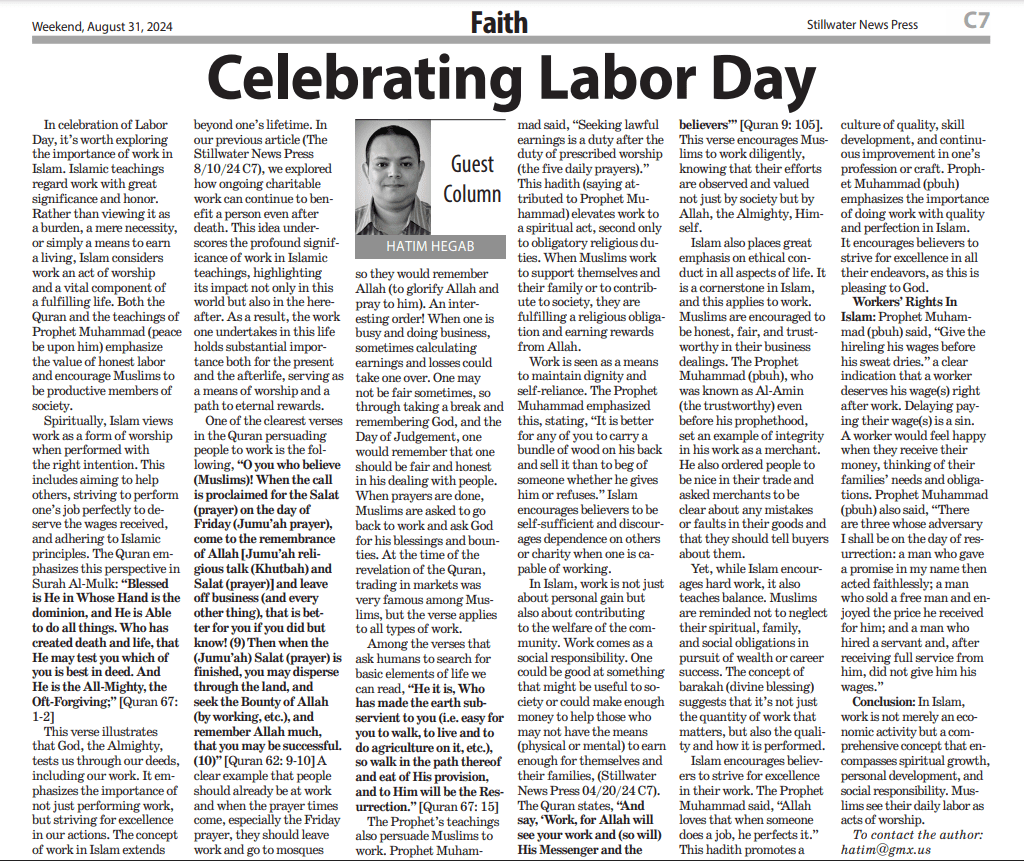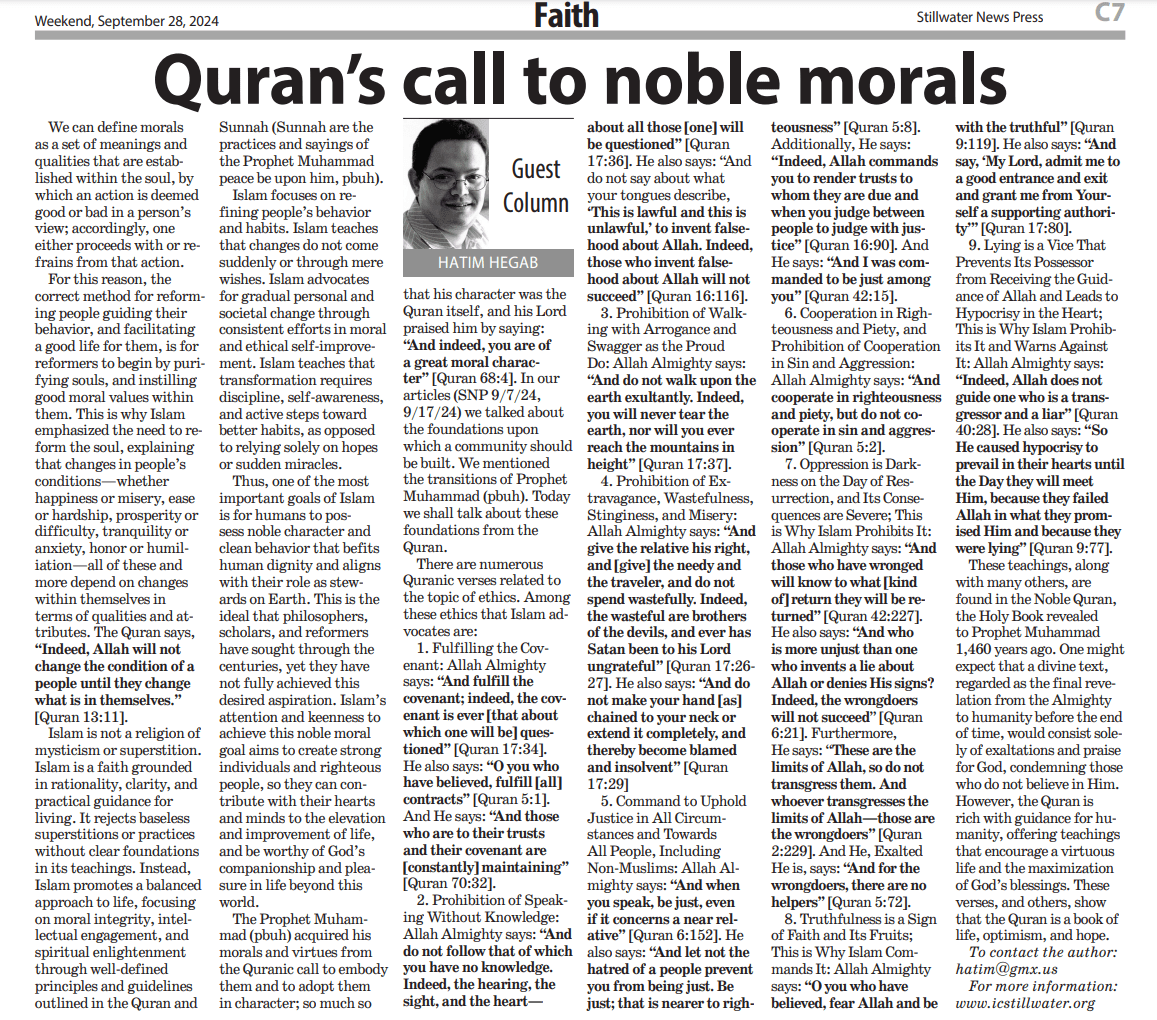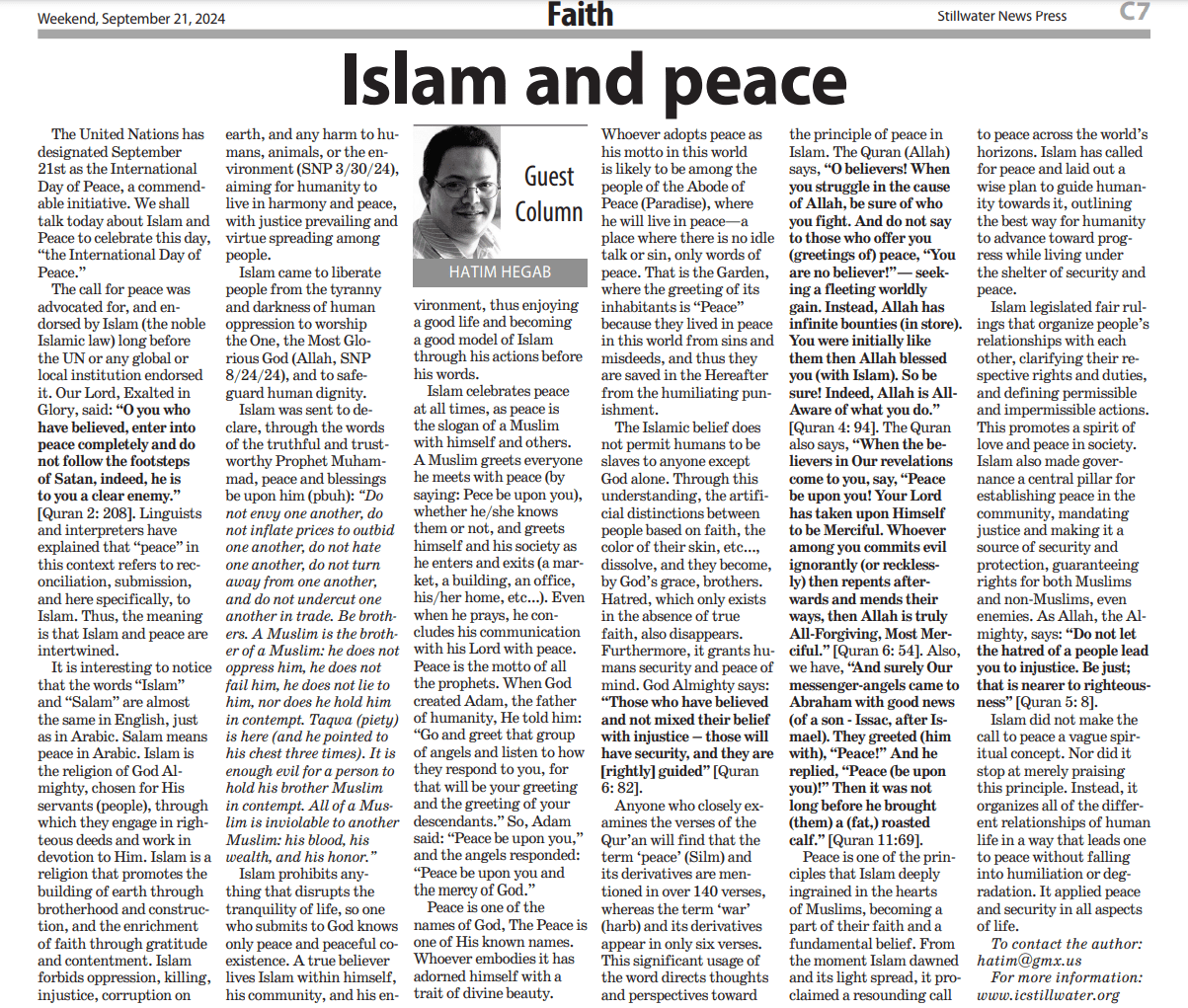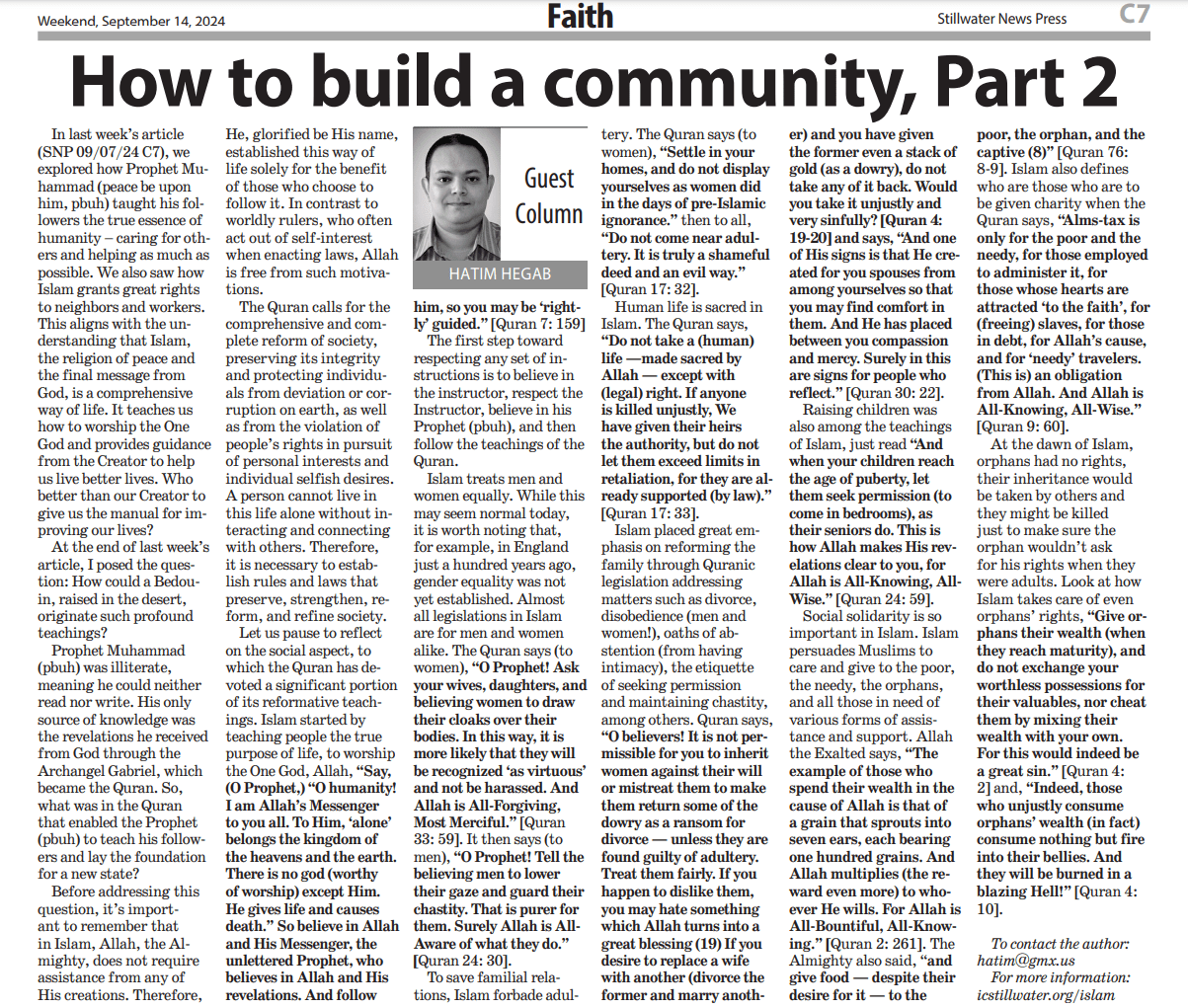09/28/2024 @ 10:39 pm
New Article Published
Dr. Hatim Hegab continues to contribute to the Faith page of the local newspaper, “The Stillwater News Press.” In his latest article, he talks about how the Quran calls for Noble morals:
The Quran consistently calls for the cultivation of noble morals, serving as a comprehensive guide for ethical conduct in every aspect of life. It encourages values such as honesty, humility, kindness, patience, and justice, positioning them as foundational for a believer’s character. The Quran emphasizes that good character is essential to a believer’s faith, reminding them that righteous deeds are not merely rituals but expressions of inner morality. Verses such as “Indeed, Allah commands you to render trusts to whom they are due and when you judge between people to judge with justice…” (4:58) illustrate the importance of moral uprightness. Honesty and justice are repeatedly highlighted as cornerstones of a strong and virtuous society, while patience, forgiveness, and humility are presented as pathways to inner peace and divine reward.
Moreover, the Quran guides Muslims toward noble behavior even in the face of adversity. For instance, believers are encouraged to return evil with good, a call to rise above negative impulses and embody high moral standards. This is seen in verses like, “And not equal are the good deed and the bad. Repel [evil] by that [deed] which is better…” (41:34). The Quran’s emphasis on noble morals extends beyond individual behavior to societal obligations, calling for kindness towards the weak, respect for parents, and fair treatment of others. By consistently promoting virtues that lead to a just and harmonious society, the Quran serves as a timeless guide for cultivating ethical behavior and ensuring the well-being of all.
(This article was published in September but was placed here as nothing could be put above the Glorified name of Allah – The one before it was “Who is Allah (SWT)))
09/21/2024 @ 10:39 pm
New Article Published
Dr. Hatim Hegab continues to contribute to the Faith page of the local newspaper, “The Stillwater News Press.” In his latest article, he discusses how Islam advocates for and promotes Peace.
Islam is a religion that emphasizes peace at its core, both in personal conduct and in societal relations. The very word “Islam” is derived from the Arabic root “Salaam,” which means peace, submission, and safety. One of the fundamental teachings of Islam is that true peace is achieved through submission to the will of God and adherence to moral and ethical guidelines that promote harmony within oneself and with others. The Quran teaches Muslims to embody peace, encouraging them to greet others with the phrase “As-Salaamu Alaikum” (peace be upon you) and to act with mercy, compassion, and forgiveness in their interactions. Additionally, Islam encourages resolving disputes through peaceful means, valuing reconciliation over conflict, as stated in the Quran: “If they incline to peace, then incline to it [also]” (8:61).
On a broader societal level, Islam promotes peace as a foundational principle in governance, justice, and international relations. Muslims are instructed to uphold justice and fairness, as these are key elements in preventing discord and promoting societal harmony. Islam’s concept of peace is not merely the absence of war but a comprehensive sense of security and well-being that permeates every aspect of life. Prophet Muhammad (peace be upon him) was known for his efforts in peacemaking, such as the Treaty of Hudaybiyyah, which exemplified his dedication to resolving conflicts through diplomacy and non-violence. By following these teachings, Muslims are encouraged to strive for peace within their families, communities, and the world at large, contributing to a harmonious existence for all humanity.
For now, Dr. Hegab’s articles on political issues are not included in this list of his articles.
09/14/2024 @ 10:35 am
New Article Published
Dr. Hatim Hegab continues to contribute to the Faith page of the local newspaper, “The Stillwater News Press.” In his latest article, he continues his talk on how to build a community…
Building a community in Islam revolves around fostering a sense of brotherhood (ukhuwah) and collective responsibility among its members. This begins with the fundamental principles of unity and cooperation, where individuals are encouraged to support one another in faith and daily life. The Quran emphasizes this in Surah Al-Hujurat (49:10), stating, “The believers are but brothers, so make settlement between your brothers and fear Allah that you may receive mercy.” Acts of kindness, charity, mutual respect, and adherence to justice lay the foundation for a thriving community.
In addition to social bonds, communal worship such as congregational prayers, Friday sermons, and Islamic events strengthen members’ ties. The Prophet Muhammad (peace be upon him) emphasized the importance of collective worship and societal duties, including helping the poor, maintaining kinship ties, and resolving disputes amicably. Through practicing these values, Muslims are encouraged to cultivate communities built on faith, cooperation, and mutual support, ensuring that every member feels valued and cared for.
(This article was published in September but was placed here as nothing could be put above the Glorified name of Allah – The one before it was “Who is Allah (SWT)))
09/07/2024 @ 10:39 pm
New Article Published
Dr. Hatim Hegab continues to contribute to the Faith page of the local newspaper, “The Stillwater News Press.” In his latest article, he discusses how Prophet Muhammad could build a community in Madinah after his Hijrah (emigration) from Makkah.
For now, Dr. Hegab’s articles on political issues are not included in this list of his articles.
CLICK THE ARTICLE (IMAGE) TO VIEW OR DOWNLOAD A PDF COPY
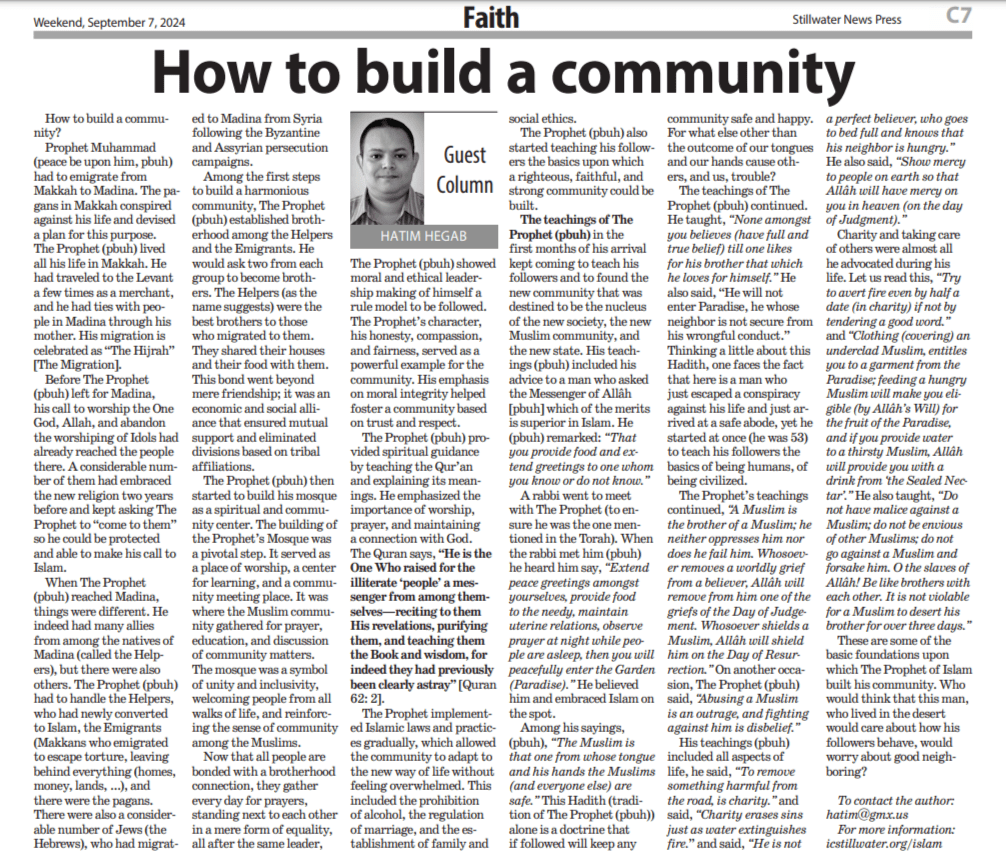
08/31/2024 @ 11:35 am
New Article Published
Dr. Hatim Hegab continues to contribute to the Faith page of the local newspaper, “The Stillwater News Press.” In his latest article, he celebrates the International Labor Day. He emphasizes the Importance of work in Islam and how workers’ rights are very sacred and important in Islam.
For now, Dr. Hegab’s articles on political issues are not included in this list of his articles.
(This article was published in August but was placed here as nothing could be put above the Glorified name of Allah – The one before it was “Who is Allah (SWT)))
CLICK THE ARTICLE (IMAGE) TO VIEW OR DOWNLOAD A PDF COPY
